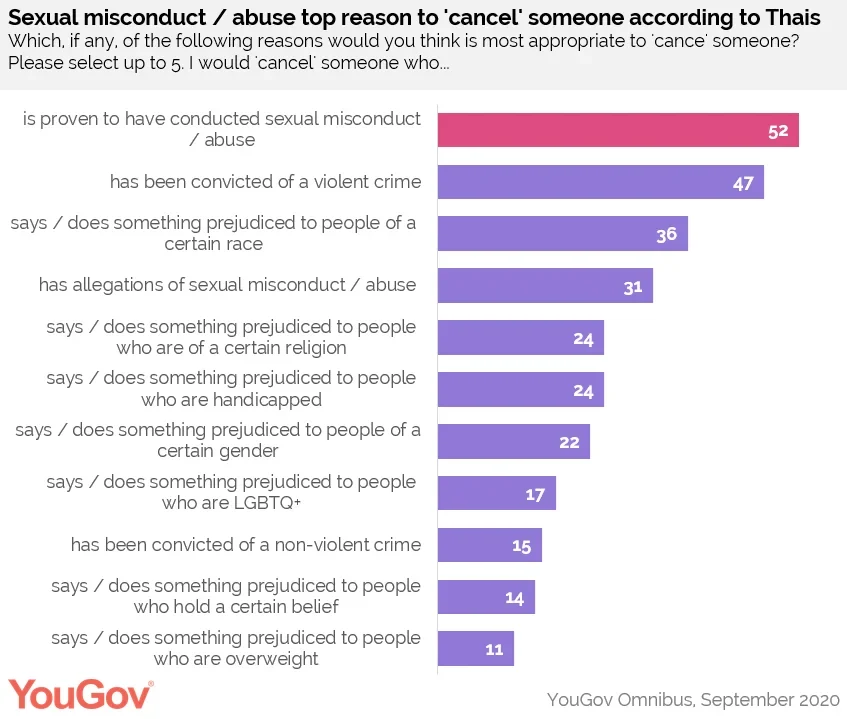
A third of Thais have ‘cancelled’ a public figure or brand
Sexual misconduct / abuse top reason to ‘cancel’ someone
The topic of cancel culture is a popular one in today’s media age, and has cropped up again recently with a popular transgender TV personality being caught in the crosshairs following her expletive comments. Latest YouGov data looks at the modern day phenomenon of cancel culture and thoughts on what it takes to cancel a public figure or brand.
The majority (87%) of Thai have heard about cancel culture, but only six in ten (57%) know exactly what it means. Those from high income households (earning more than THB 50,000 a month) are much more likely to know what cancel culture is compared to low income households (earning less than THB 25,000 a month) (70% vs. 51%). For the purposes of this survey, ‘cancelling’ has been defined as withdrawing support for public figures and companies after they have done or said something considered objectionable or offensive.
A third (34%) of Thais have ‘cancelled’ a public figure or brand. The data shows that men are more likely to cancel a public figure than women (38% vs. 31%) are, and the same can be said about them being more likely to cancel brands (38% vs. 29%).

Of all the reasons to ‘cancel’ someone, Thais believe the top reason to ‘cancel’ someone is if they are proven to have conducted sexual misconduct or abuse, with half (52%) selecting this option. This is compared to a three in ten (31%) who said allegations of sexual misconduct or abuse is a valid reason to ‘cancel’ someone. Other top reasons to cancel someone is if they have been convicted of a violent crime (47%), saying / doing something prejudiced to people of a certain race (36%), and saying / doing something prejudiced to people of a certain religion (24%). Only one in ten (11%) believe saying / doing something prejudiced / discriminatory to people who are overweight is a valid reason to cancel someone. About the same amount (9%) think there is no valid reason to cancel someone.
The main way one would ‘cancel’ a public figure / company is by stopping support in ways that may result in financial gain (54%) and unfollowing them on social media (47%). A smaller amount would take more active measures – such as filing a police report (26%) or rallying others to withdraw their support for the public figure / company on social media (25%). About one in seven (16%) would write into the public figure / company’s employers / sponsors to pressure them into withdrawing their employment / support.
As a whole, two-thirds (65%) of Thais agree that cancel culture keeps public figures and companies accountable for the things they say or do. A quarter (26%) are undecided, and one in ten (9%) disagree. Three in ten (30%) however, believe that cancel culture encourages cyberbullying, and a similar amount (27%) thinks that it is pointless and ineffective.
Siriporn Kittichutchawarl, Country Manager at YouGov Thailand commented: “In this digital age, with Thais spending so much time on social media, it is perhaps unsurprising that the majority of Thais are aware of cancel culture – and a significant amount have ‘cancelled’ a public figure or brand.
***Results based on 2,080 Thais surveyed on YouGov Omnibus